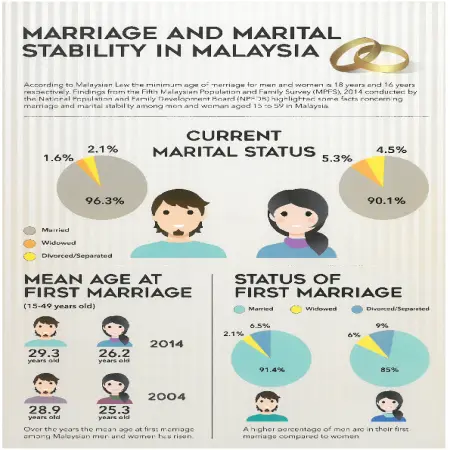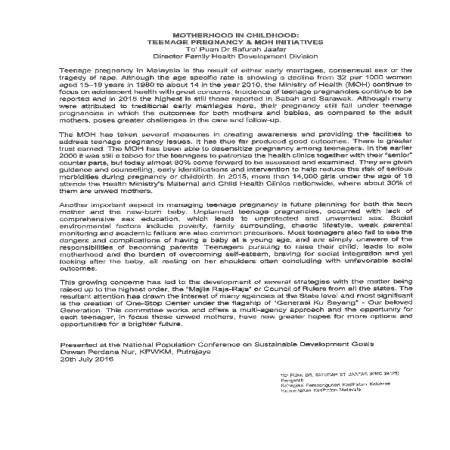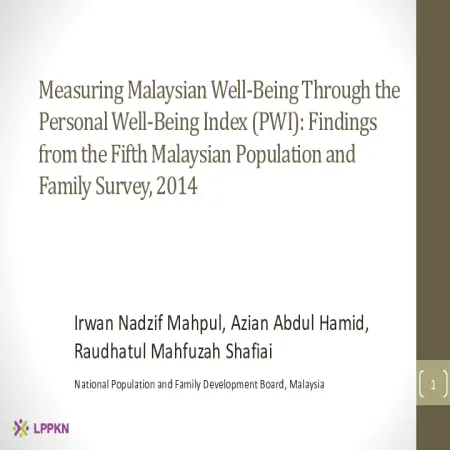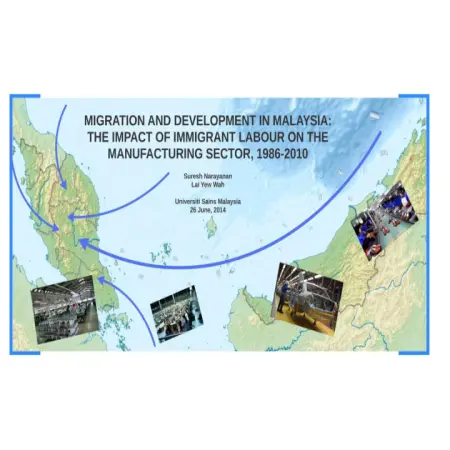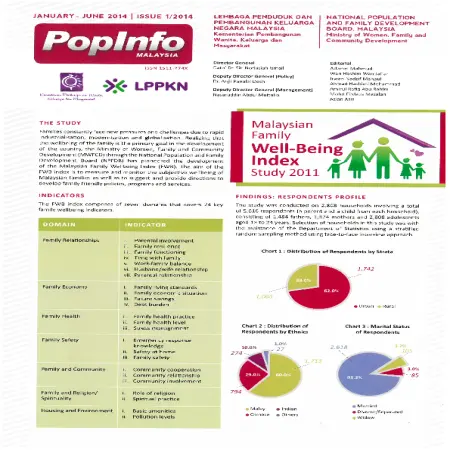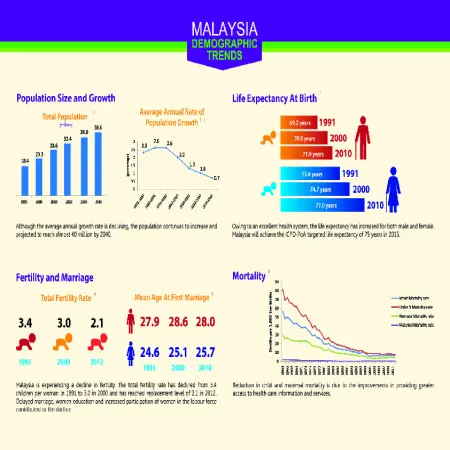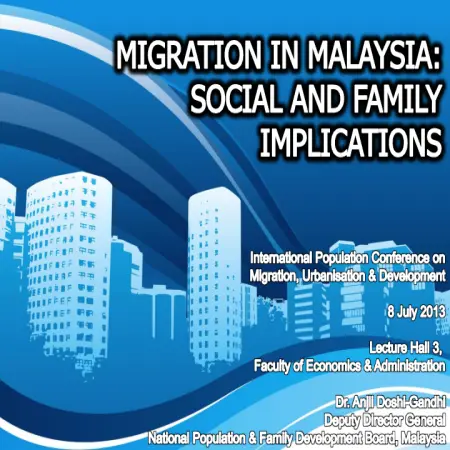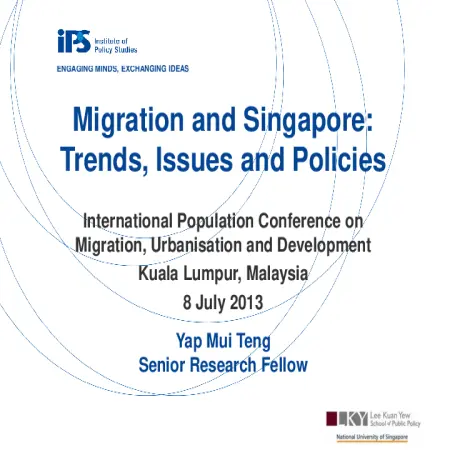Browse by Division/Agency
Results for Division/Agency : "LPPKN - National Population and Family Development Board, Malaysia: Population and Family Research Division"
|
|
Malaysian infertile men and women : do they suffer mental health issues?
Item Type: Conference or Workshop Item
Editor:
Year: 00/00/2017
Abstract: This study revealed that Malaysian infertile men and women demonstrated susceptibility to mental health problems that occurs more commonly among women than men. Thus, this study may facilitate fertility facilities to strategize and redesign better intervention for the infertile couples.
|
|
|
|
|
|
Motherhood in childhood: teenage pregnancy & MOH initiatives
Item Type: Conference or Workshop Item
Editor:
Year: 00/00/2016
Abstract: Teenage pregnancy in Malaysia is the result of either early marriages, consensual sex or the tragedy of rape. Although the age specific rate is showing a decline from 32 per 1000 women aged 1-19 years in 1980 to about 14 in the year 2010, the Ministry of Health (MOH) continue to focus on adolescent health with great concerns. Incidence of teenage pregnancies continue to be reported and in 2015 the highest is still those reported in Sabah dan Sarawak. The MOH has taken several measures in creating awareness and providing the facilities to address teenage pregnancy issues. They are given guidance and counselling, early identifications and intervention to help reduce the risk of serious morbidities during pregnancy or childbirth. This presentation discusses about teenage pregnancy problem in Malaysia.
|
|
|
|
|
|
Measuring Malaysian well-being through the personal well-being index (PWI): findings from the fifth Malaysian Population and Family Survey, 2014
Item Type: Conference or Workshop Item
Editor:
Year: 00/00/2015
Abstract: The aim of this study is to measure the well-being of Malaysian population through the use of PWI scale developed by the International Wellbeing Group (IWbG). Responses on the PWI scale were collected from over 10,000 adults aged 18 to 59 drawn from a sample of 18,852 living quarters throughout the country. Through the MPFS-5, the Personal Well-Being Index for the Malaysian was recorded at 7.71 out of a maximum score of 10. Out of the eight domains identified, the Spirituality or Religion domain recorded the highest score of 7.56. It then followed by the domain scores of Personal Relationships (7.54), Community-Connectedness (7.52), Personal Safety (7.35), Personal Health (7.10), Future Security (6.96), Standard of Living (6.58) and Achieving in Life (6.56).
|
|
|
|
|
|
Malaysia's initiatives for sustainable family development
Item Type: Book Section
Editor:
Year: 01/01/2014
Abstract: Various initiatives to strengthen the family institution have been undertaken by the Government of Malaysia through the Ministry of Women, Family and Community
Development (MWFCD). Through its agency, the National Population and Family Development Board (NPFDB), the MWFCD has formulated, developed and implemented policies and programmes such as the National Family Policy,
1Malaysia Family First (1MF1st) and 1Malaysia Youth Empowerment and Support (1MYes) programmes, One-Stop Family Centres, and family education programmes such as the Strengthening of Marriage Institution (SmartStart remarriage programme), Parenting@Work, Smart Belanja@Lppkn (family financial management programme), KASIH Parenting Modules and counselling services.
To ensure sustainable family development, the National Family Policy (NFP) and its accompanying plan of action was launched in March 2011 and implemented by the NPFDB in partnership with other ministries, departments and related non-government organizations (NGOs). The aim of this explicit policy is to develop prosperous, healthy and resilient families to ensure social stability. The NFP is
a key policy that focuses on aspects of family well-being and development, providing direction for the development of family-friendly programmes and services for nurturing healthy and resilient families in line with the aspirations
of Vision 2020.
|
|
|
|
|
|
Migration and development in Malaysia: the impact of immigrant labour in the manufacting sector, 1986-2010
Item Type: Conference or Workshop Item
Editor:
Year: 00/00/2014
Abstract: The heavy reliance on immigrant labour in manufacturing remains a contentious issue and we address three concerns with respect to their impact are did they displace native workers or complement them? Did their influx impede real wage growth? And did they lower real productivity growth? We found that immigrants complemented local workers in the initial phase when a labour shortage emerged at prevailing wage levels but displaced them in later periods because employers favoured them due to significant non-wage cost savings. Finally, the contention that immigrant labour use contributed to keeping productivity low found some support. In the light of these findings we discuss policy options with respect to immigrant workers.
|
|
|
|
|
|
Malaysian family well-being index study 2011
Item Type: Newsletter
Editor:
Year: 00/00/2014
Abstract: Realizing that the wellbeing of the family is the primary goal in the development of the country, the Ministry of Women, Family and Community Development through the National Population and Family Development Board (NPFDB) has pioneered the development of the Malaysian Family Wellbeing Index (FWB). The aim of the FWB index is to measure and monitor the subjective wellbeing of Malaysian families as well as to suggest and provide directions to develop family friendly policies, programs and services. The study was conducted on 2,808 households involving of 5,616 respondents. Through this study, the Family Wellbeing Index (FWB) was recorded at 7.55 out of a maximum score of 10 indicating that Malaysian families have a relatively high level of wellbeing and are able to manage the challenges of development. Of the seven domains identified, the Family and Religion / Spirituality domain recorded the highest score of 8.25.
|
|
|
|
|
|
Migration in Malaysia: social and family impact
Item Type: Conference or Workshop Item
Editor:
Year: 00/00/2013
Abstract: This paper highlights the key findings from surveys done by the Ministry of Women, Family and Community Development (MWFCD) and the National Population and Family Development Board (NPFDB). The Survey on the Implications of Employing Foreign Domestic Helpers (FDH) on the Family Institution in Malaysia was conducted by the MWFCD in 2009. The study found that many families rely on FDH for child care and domestic work. Some of the families find that having a FDH has a negative effect on their family relationships while some have no problems with it. The study on Indonesian Migrants in Tawau, Sabah conducted by the NPFDB in 2010 found that the local community in Sabah felt that the presence of Indonesian migrants in their community had both positive and negative effects. The effects of migrants were studied from the perspective of economy, education, health, safety, culture, housing and neighbourhood.
|
|
|
|






